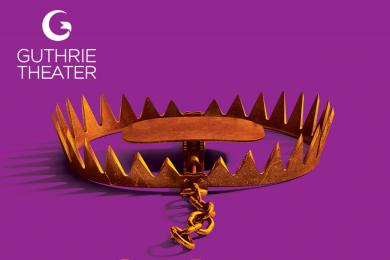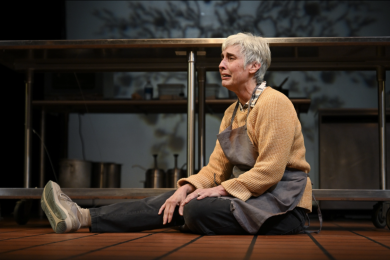More mysterious wonderful magic
There’s a moment late in Pillsbury House Theatre’s The Children where a character is reminded that Pandora was left with Hope after unleashing evil on the world, and also that Hope was bottled up in a jar of evils in the first place. That moment is The Children in a nutshell, a metaphor-strewn story with one foot in modern times, one foot in ancient mythology and a stash of secrets nestled under each foot.
The first thing that takes your attention stepping into Pillsbury House is Joel Sass’s set design. We’re inside a rural cabin, one of those spaces that’s designed to be cozy and rustic but reads as remote and menacing to anyone who’s spent much time at the movies. The place is all richly colored wood and sharp angles, with enough pointy objects and shadowy corners to make it inherently unsettling. As the show unfolds, hidden passages and secret crannies reveal themselves, bringing to mind Sass’s marvelous, mysterious work on Open Eye’s Nothing is Something a few years back. These subtle hiding spots offer convenient protection for our protagonists, but true to the spirit of the show, that may not be a good thing.
So far I’m making The Children sound like a full-on mystery story. While that’s certainly a part of it, this is also a play where two members of a Greek Chorus break free of their narrative duties to spirit away the children of the murderous sorceress Medea and stash them in modern-day Maine while a hurricane bears down and an avuncular sheriff tries to evacuate everyone to the local middle school. Oh, and the children are played by adult actors operating child-sized puppets who look just like them. Clearly, there’s a lot going on here, enough so that I spent most of the first 10 minutes trying to decide if I had any idea what was happening.
Unrealiable narrators abound
But that’s one of the great strengths of Michael Elyanow’s script: information and motivations are parceled out sparingly from the points of view of at least five narrators, none of whom is a model of reliability. As befits a loose adaptation of Euripides transported to the Eastern seaboard, the story comes together in a whirl of language pulling equally from children’s storybooks, “Renni-fest” English, and the laconic drawl of rural Maine. It’s a cacophonous yet purposeful blur of dialogue that becomes more and more musical as the show rolls on.
Of course, pulling off that kind of effect depends largely on putting those words in the right mouths. Director Noël Raymond has a ridiculously stacked cast to work with. Everyone here is a decorated veteran of the local stage, and it shows. Tracy Maloney and Michelle O’Neill exude prickly chemistry as the runaway chorus members trying to maintain a partnership founded on unstable ground, while Jim Lichtscheidl’s perplexed but patient small-town cop nearly steals the show as he tries to make heads or tails of their fractured explanations. In The Children’s most light-hearted moments, one could almost see this trio heading up a fish-out-of-water comedy.
Two actors make four
But The Children is by no means a comedy, as evidenced by the spooky presence of the title characters. If there’s one image from this show that’s likely to stick with audiences, it’s Kurt Kwan and Kate Guentzel peering into the darkness while flanked by Masanari Kawahara’s realistic wooden puppets carved in their own likenesses. The puppets are more than just a clever way to cast seasoned adult actors in children’s roles; they’re an effective means for communicating the play’s themes of distorted reality and the sometimes dangerous power of story. They’re also an opportunity for Kwan and Guentzel to stretch their considerable abilities. With actors and puppets sharing the stage in full view of the audience, they’re essentially giving two performances at once, a task both actors pull off without coming across as distracting or unnatural.
One catch-22 of telling any kind of mystery story, even one as inventive as this, is that it’s often more stimulating to watch the pieces coming together than it is to see the finished puzzle. While the culmination of The Children is largely satisfying, even powerful, the story hits a few too-familiar beats in its finale. It isn’t a tidy conclusion by any means, but compared to what’s come before it does feel a tad conventional. Still, that’s one letdown in a show that doesn’t provide many of them.
It’s a thought-provoking, frequently funny, consistently surprising piece of work where past, present and future coalesce and hope is both a blessing and a curse.




